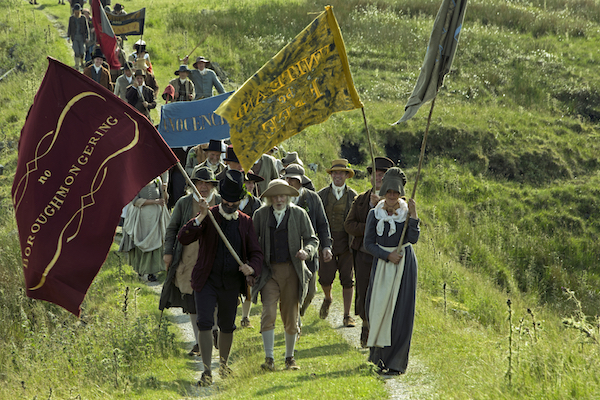It will ensure that the bloody events in St Peter’s Fields nearly 200 years ago are put back on the radar of politicians, historians and cultural commentators alike
Mike Leigh’s epic new film Peterloo (premiering this week in Venice) is bound to foster awareness about an event which no-one in Britain now pays much attention to. In August 1819, mounted “yeomen” militia charged into a huge crowd that had gathered in St Peter’s Fields, Manchester, to listen to a speech from campaigning political reformer, Henry Hunt.
15 people were killed and several hundred injured in the ensuing mayhem. The carnage was reported in national and local newspapers. It marked a transformational moment in British history. As the historian E.P. Thompson noted,” the moral consensus of the nation outlawed the riding down of an unarmed crowd.”
To put it another way, the authorities realised they couldn’t get away with violent attacks on crowds, even if they didn’t approve of those crowds’ politics or their reasons for assembling
Leigh’s achievement is to have made a period film with the same immediacy and sense of anger that runs through contemporary dramas like Hillsborough or Bloody Sunday. He has a huge ensemble cast but that exhaustive attention to detail and fascination with the eccentricities of human behaviour which has always characterised his work is still there.
The film starts four years before Peterloo, with the battle of Waterloo. Leigh doesn’t bother with Wellington or Napoleon. Instead, he homes in on a lone bugler in the middle of the carnage.
This is Joseph, a traumatised young man who, after the battle, makes his way home to the north of England, still wearing his red coat. Here, he finds poverty and hardship. Mill owners are cutting wages. Bread itself is being taxed.
“Might you be familiar with the north of England?” a character in the well-to-do south is asked early in the film. In the eyes of the government, it is the savage hinterland of the country. While people in northern mill towns are starving, the politicians back in London are voting to give 750,000 pounds (a vast sum) to Wellington as tribute for his heroics at Waterloo.
Their attitude toward any “rabble” that protests about not having the vote or lacking representation in Parliament is that they should be “awed into submission.” The country’s rulers do not want their citizens to try to emulate the “odious” French revolution.
Leigh exposes the gaping fissures in British society of the period. He also fills the film with the type of characters you might expect to encounter in a Charles Dickens novel or a Hogarth painting – pompous local dignitaries, Bill Sikes-like blackmailers and conceited army officers. The Prince Regent (Tim McInnerny) is a decadent buffoon.
The Home Secretary Lord Sidmouth (Karl Johnson) is like a more cunning, better spoken, upper-class version of Albert Steptoe. Even “orator Hunt” (Rory Kinnear), who speaks so eloquently on behalf of the common man, is shown in a very ambivalent light. He’s the “Wiltshire peacock,” a narcissistic minor celebrity who basks in the adoration of the crowds.
The director’s frame of reference is astonishing. One moment he will be showing us a meeting of the Manchester Female Reform Society and the next we will see the dashing officer General Sir John Byng (Alastair Mackenzie) bunking off at the races when he should be commanding the cavalry in St Peter’s Square.
Thanks to backing from Amazon Studios, Leigh has a far bigger budget than on any of his previous features. This shows itself not just in the huge cast but in the massacre itself, in which we see the cavalry charge into the vast crowds.
With so much going on and so many different characters, the film occasionally loses its dramatic impetus. Arguably, it wasn’t necessary to throw in shots of fiddlers playing their music or of attendees at the St rally sharing their picnics or comparing notes on when they got up or how far they’ve come.
Then again, one of the points about Peterloo is that the film doesn’t have a hero. It is about the collective experience of the massacre. The most prominent actors, whether Maxine Peake as a matriarch trying to hold her family together in the face of extreme deprivation or Kinnear as the orator, share screen time with dozens of others.
As a story of a massacre, Peterloo is bound to end on a grim note. However, it has plenty of humour and pathos along the way. The journalists (not a breed Leigh generally likes) emerge with credit for reporting promptly and truthfully on what happened at the Manchester rally.
Leigh himself shows he is just as comfortable helming historical epics as he is making tightly focused contemporary dramas like Happy-Go-Lucky or Another Year. At 75, the British director is still clearly at the peak of his powers.
Whatever else, his latest film will ensure that the bloody events in St Peter’s Fields nearly 200 years ago are put back on the radar of politicians, historians and cultural commentators alike.

